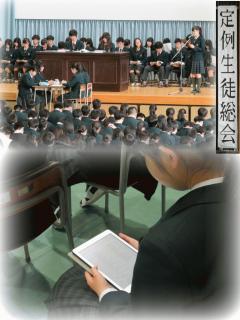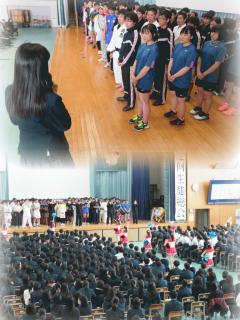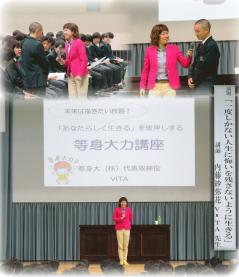生徒総会・壮行会
本日行われた生徒総会では、1・2年生がiPadで総会の資料を閲覧していました。
また、壮行会では応援団のエールがありました。
選手たちには尚志高校の代表として精一杯頑張って欲しいと思います。

At the student council meeting held today, first and second graders were browsing the materials of the council on iPad.
Also, at the send-off party, there was cheering by supporters.
We want all the players to do their best as representatives of Shoshi High School.
2019.5. 9 更新
部活動情報(サッカー部女子)
5月の予定表、キッズコミット 2019、メグミルクカップ、ウェイトトレーニングの記事です。
This is an article about the women's soccer club schedule in May, Kids Commit 2019, Meg Milk Cup, and weight training.
Women's soccer club >>
2019.5. 9 更新
情報総合科 コンピュータデザインコース 作品展示のお知らせ
令和元年5月8日(水)から31日(金)の期間、福島銀行荒井支店ロビーにて平成30年度情報総合科コンピュータデザインコース3年生の卒業制作の一部を展示しています。お近くにお寄りの際はぜひご高覧ください。
In the lobby of the Arai Branch of the Fukushima Bank, a part of the graduation work of the 3rd year of the Computer Design course in the Information Technology Course for fiscal 2018 is exhibited from May 8, 2019 to 31st. Please take a look.
2019.5. 9 更新
就学支援金受給申請について(保護者の皆様へ)
保護者の皆様へ >> のページに就学支援金受給申請についての連絡を掲載しました。
We posted a notice about High School Tuition Support Fund on the page for Guardians >> .
2019.5. 8 更新
進学相談会 5/23 郡山ビューホテルアネックス
5月下旬より7月上旬にかけて、多くの進学相談会が開かれます。この進学相談会には数多くの学校が参加しているため、短時間で様々な学校の入試担当者から直接話が聞くことができ、上級学校を比較することができます。
また、保護者の方を対象にした説明会や講演等も企画されているので、保護者の方と一緒に参加することも可能です。3年生はもちろんのこと、1・2年生も参加できますので、積極的に参加して、上級学校研究をして下さい。
進学相談会で学校の研究・比較 ⇒ 各校のオープンキャンパスへの参加 ⇒ 目標設定
※会場には、学校ごとの個別ブースがあって、様子によっては「近付きにくい」と感じることもあると思います。
そんな時は「○○学部●●学科について教えて下さい」「△△の学習に興味があります」というような一言で、上級学校のことを丁寧に説明してくれます。入試広報担当者の方から、情報を手に入れましょう。
■5月23日(木)郡山ビューホテルアネックス >> 主催:栄美通信
進路だより No.4より
From the end of May to the beginning of July, there are many consultation meetings for students going on to higher education.
Many schools participate in this counseling session, you can hear directly from admissions officers of various schools in a short time, and compare higher schools.
Explanatory meetings and lectures for parents are also planned, so parents and guardians can participate together.
Not only the 3rd grade students but also the 1st and 2nd grade students can participate, so why don't you actively participate?
■Thursday, May 23 Koriyama View Hotel Annex >>
2019.5. 8 更新
等身大力講座(3学年 進路行事)
4月26日(金)、3学年の生徒を対象に内藤紗弥花VITA先生をお招きして「等身大力講座」と題して進路講演会が行われました。生徒一人一人に寄り添い、発想の転換力で進路実現を果たしていく様々なヒントをお話いただきました。
Career Events (3rd grade)
On Friday, April 26, Sayaka Naito VITA, instructor, was invited to give a course lecture on "life-size course" for students in the 3rd grade. The students shared various tips on how to realize their career path with their ability to change their way of thinking.
2019.5. 7 更新
5月6日〜5月12日の日程
|
【朝学】 3学年:尚志ノート記入,1,2年:学習記録(Classi)入力 |
|
| 6(月) |
・振替休日 |
| 7(火) |
・正式時間割開始 |
| 8(水) |
・平常授業 |
|
9(木) |
・生徒総会・壮行会(5~7校時) |
|
10(金) |
・平常授業 |
|
11(土) |
・週休 |
| 12(日) |
SB(休日用運行経路) |
|
※ 9日(木) 午前 短縮40分授業 ※ ※10日(金)学級役員校長面接(昼休み) 1学年:12:40開始, 2学年:12:50開始, 3学年:13:00開始 【スクールバス略記号】 |
|
2019.5. 4 更新
![]()






